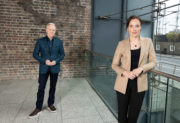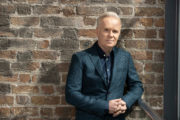Series 2, Episode 3
Ella and Richard will be joined in studio by two engaging guests. Denise Charlton, CEO, The Community Foundation for Ireland will discuss how generous Irish people have been to charity, especially in the last 12 months. Sinead McSweeney, VP of Public Policy with Twitter will also be in studio for a wide ranging chat on future proofing businesses against future uncertainty.
Episode 3 Changing face of charities due to Covid:
In a year when so many businesses have been rocked financially by Covid, the charity sector has rather unexpectedly thrived. From the small, local to the huge and well known, charities across the country have been forced to come up with new and often rather chilly ways to raise money.
Padraig O’Hora and David O’Malley had a vision to build a sensory park in their local town of Ballina. They came up with an idea to ask people to jump into the local icy cold River Moy, and donate money and then to nominate the next poor soul to the take the plunge. The fundraiser became known as the Freeze4February.
And the biggest, most well know charities in the country have also been forced to change. Irish Cancer Society is renowned for its Daffodil Day each year.
But charity companies who relied completely on their high street shops for donations were almost completely shut down like the rest of the retail sector for the whole of 2020. Jack and Jill had to close all 8 of their Shops when Covid hit. They previously had no online presence and had to think quickly and signed up to sell their stock through a new app Thriftify.com.
Thriftify is an app founded by a young Irish entrepreneur. Back in 2018 Ronan Ó Dálaigh wanted to make shopping online for charity retailers a reality. Prior to Covid the app allow the app sold books on behalf of NCBI. Then in 2020 it began selling clothes on behalf of various different charity shops. During the first lockdown 25% of Irish charities had signed up to Ronan’s app but after the second lockdown that grew to 95% of Irish charities.
Episode 3 How do businesses future proof against future pandemics:
Covid-19 is not our first pandemic and it won’t be our last. As the vaccine rollout continues and gathers strength, one thing that the pandemic has taught business in the last year is that the future will look different for many sectors. But how can businesses future proof for new virus strains, spikes and potentially other pandemics?
All sectors must try and think to the future, yet it’s easier for some more than others. Many have seen this as opportunity to reshape workplace culture using technology, others can reimage their business model, but there are those who must wait in hope.
With 60,000 team members worldwide, and 700 employees in Ireland, Hewlett Packard Enterprises were looking to the future long before Covid-19 arrived. Maeve Culloty, Managing Director of Hewlett Packard Enterprises Ireland, believes the work place culture of the future has changed for the better.
Dublin restauranteurs Sandy and John Wyer weren’t afraid to think about the future. Looking at their trio of restaurants, they temporarily closed the doors to two of their venues. They bravely launched Little Forest in November, focusing on click and collect pizza orders. But the biggest change came at Forest Avenue, their critically acclaimed restaurant, reopening as a greengrocer overnight – a decision they don’t regret.
For the 7,400 publicans across the country, sadly they are still waiting for a roadmap out of the Covid-19 restrictions. Kilkenny publican Pat Doyle misses his loyal customers. Originally run by his father, Mick Doyle’s pub has been in the family since 1958. A traditional Irish bar, Pat feels his only option to get the buzz back is to wait for the vaccination roll out to be almost complete, so he can reopen as normal. Yet who knows when that will happen.
Episode 3 Learning to surf during a pandemic with no water..
Cathal Sheridan is an industrial designer from Creeslough, Northwest Donegal with a passion for surfing and was always trying to find ways to improve his wave-riding skills. In 2018 when he moved to Galway and couldn’t surf as much, he designed a balance board for himself to make sure he didn’t lose his skills. He then realised that this product could work for anyone who wanted to improve their posture, coordination and balance and so the business was born.
So after several design iterations, he launched the Huku Original Balance Board. It was an instant hit, so he decided to set up his own company making health and wellness products which help the user to increase their coordination, balance, core strength and improve posture.
“Our products are the perfect remedy to today’s office worker who spends most of their day sitting in front of their computer,” says Sheridan. “We offer help to negate the effects of long-term sitting and inactivity and our range of balance boards are also the perfect tool for getting a workout at home.”
It wasn’t until the first lockdown that Cathal really threw himself into the business realised there was a massive demand for his product. He now has 7 products for people with all different abilities and requirements. He started the business alone and now as 6 employees helping him meets the distribution demands.
Series Overview:
Throughout our series, we will be highlighting and headlining the big themes affecting both businesses and consumers over the last 12 months. Our new ways of working, shopping and eating have been transformed, but will they last even after lockdown is lifted?
As the entire country looks for the early signs of recovery, we analyse how quickly and easily our economy and businesses can emerge from this extraordinary time, after 12 frustrating months of gruelling lockdown.


